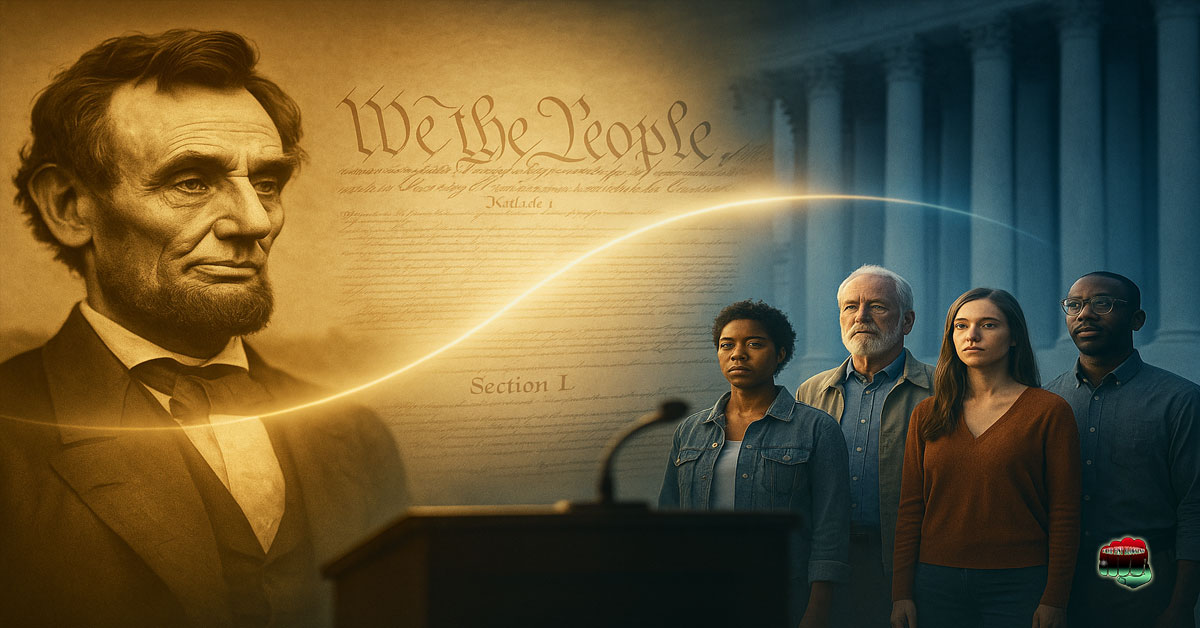By InnerKwest Global Intelligence Team — September 6, 2025
Editor’s note: This rebuttal reflects not only InnerKwest’s editorial board but a broad American consensus—from Lincoln scholars and nonpartisan constitutional institutions to settled Supreme Court precedent—affirming the United States as a civic nation bound to a creed of equal citizenship.
On Tuesday, at the National Conservatism Conference in Washington, Sen. Eric Schmitt (R-MO) argued that America is not an “abstract proposition” but “a nation and a people” that “belongs to us,” casting national identity as an inheritance rather than a creed. That framing doesn’t merely pick a side in a policy fight; it repudiates the American consensus that stretches from Lincoln’s words at Gettysburg to Reconstruction’s constitutional settlement and the Supreme Court’s birthright-citizenship jurisprudence.
What Lincoln actually said—and why it matters
In 1863, Lincoln named the United States “a new nation, conceived in Liberty, and dedicated to the proposition that all men are created equal.” The nation, he insisted, is tied together by a shared idea, not a shared bloodline.
Five years earlier, Lincoln described an “electric cord” running through the Declaration—binding anyone who embraces its truth “as though they were blood of the blood, and flesh of the flesh of the men who wrote that Declaration.” In modern terms: people become American by consent to a creed, not by ancestry.
Schmitt’s claim that America is not a proposition nation but a patrimony flips Lincoln on his head. It suggests that belonging flows from lineage—an ascriptive nation—rather than from allegiance to a universal promise. That is a profound break with the “party of Lincoln” and with the mainstream of American constitutionalism.
The constitutional settlement since 1868
The war over the Union’s meaning didn’t end in metaphor; it ended in law. The Fourteenth Amendment established a national citizenship that does not depend on bloodline: “All persons born or naturalized in the United States…are citizens.” That is the constitutional anchor of civic nationhood.
In United States v. Wong Kim Ark (1898), the Supreme Court confirmed that a man born in San Francisco to Chinese subjects was a U.S. citizen by birth. The Court read the Fourteenth Amendment to embrace jus soli—place of birth—subject to narrow exceptions (e.g., diplomats). That remains binding precedent and the lodestar of American belonging in law.
Why Schmitt’s story is historically false—and exclusionary
Schmitt’s narrative elevates ancestral “heritage” and a mythic settler saga over the plural, legal nation Lincoln envisioned—casting America as a hereditary estate that “belongs to us” and treating newcomers with suspicion even when they seek lawful membership. Reportage and analysis of his remarks identified this turn plainly: away from Lincoln’s civic creed and toward blood-and-soil nationalism.
That move isn’t neutral history. It erases Indigenous nations, narrows the circle of “real” Americans, and invites a two-tier system where equal fellow citizens are treated as permanent others. It rejects the consensus that the Constitution—especially the Fourteenth Amendment—binds a diverse people into one civic nation.
The Missouri irony: from Dred Scott to equal citizenship
It is no small irony that this rechristening of American identity comes from a Missouri senator. The infamous Dred Scott case began in St. Louis; its holding that Black people were not citizens stands as a stain Lincoln’s generation erased through the Reconstruction Amendments. The Fourteenth Amendment’s Citizenship Clause and later Wong Kim Ark directly repudiate the Dred Scott vision of belonging by caste.
The record behind the rhetoric (briefly)
Schmitt’s NatCon speech doesn’t stand alone. His political record includes leading Missouri into Texas v. Pennsylvania (the Supreme Court rejected the bid to overturn other states’ 2020 results for lack of standing), aggressive COVID-era suits against local school policies (a Missouri judge ruled the AG lacked authority to order districts to end mandates), and Murthy v. Missouri, where the Supreme Court held the plaintiffs lacked standing to enjoin alleged “censorship.” All three episodes share a throughline: sweeping claims at odds with constitutional limits.
The American consensus
What, then, is the consensus Schmitt denies? It is Lincoln’s proposition nation, constitutionalized by the Fourteenth Amendment and applied in Wong Kim Ark: Americans are bound by a creed of equal citizenship, and membership is open to all who are born under our laws or who join by naturalization and allegiance. That’s not partisan spin; it’s how the Constitution and the Court have defined us for over a century.
To say America “belongs to us” by heredity is to erase that settlement and to re-litigate a question the nation resolved at terrible cost. Lincoln was right—and the law still says so.
Sources
- Schmitt’s NatCon remarks & coverage: The Daily Signal transcript/excerpt; AP/WaPo/C-SPAN listings; video of the speech. (The Daily Signal, AP News, The Washington Post, C-SPAN, YouTube)
- Lincoln’s texts: Gettysburg Address; “electric cord” speech. (Lincoln Library, Rare and Manuscript Collections, Utah Valley University)
- Constitutional framework: Fourteenth Amendment (Constitution Annotated). (Congress.gov)
- Birthright citizenship precedent: United States v. Wong Kim Ark (Justia; National Constitution Center). (Justia Law, Constitution Center)
- Historical counterpoint: Dred Scott (National Archives/Oyez). (National Archives, Oyez)
Support InnerKwest: Powering Truth & Excellence with Bitcoin
At InnerKwest.com, we are committed to delivering impactful journalism, deep insights, and fearless social commentary. Your Bitcoin contributions help us execute with excellence, ensuring we remain independent and continue to amplify voices that matter.
Support our mission—send BTC today!
🔗 Bitcoin Address: 3NM7AAdxxaJ7jUhZ2nyfgcheWkrquvCzRm© 2026 InnerKwest®. All Rights Reserved | Haki zote zimehifadhiwa | 版权所有.
InnerKwest® is a registered trademark of Inputit™ Platforms Inc. Global
No part of this publication may be reproduced, distributed, or transmitted in any form or by any means without prior written permission. Unauthorized use is strictly prohibited.
Thank you for standing with us in pursuit of truth and progress!![]()


